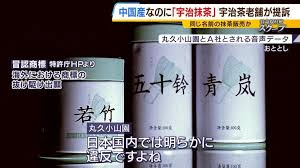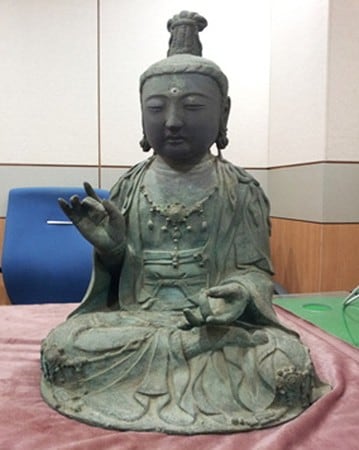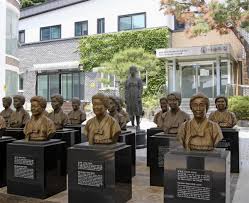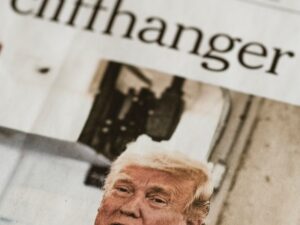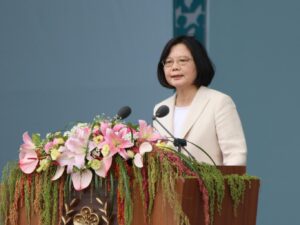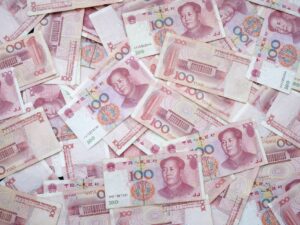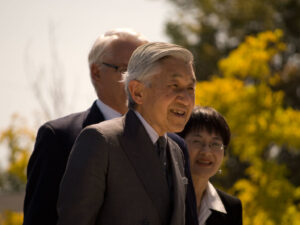MBS
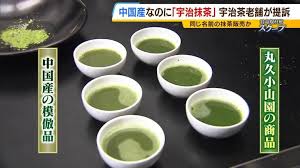
Matcha green tea from Uji, Kyoto, is popular even among foreign countries, but counterfeit products are said to be circulating in China. Over this issue, a long-established Uji tea shop with a 300-year history in Kyoto sued another long-established shop, Company A, which has been in business for more than 150 years. The approach to Byodoin Temple in Uji City, Kyoto Prefecture, is frequented by many tourists in search of the famous matcha tea. (A tourist from China) “I am a fan of matcha. (Tourist from China) “Matcha is very famous, especially Uji matcha. Uji matcha has an astringent taste at first, and gradually sweetens up. Its trademarked matcha products, “Isuzu,” “Wakatake,” and “Aorashi,” are representative products and have been protected for more than 60 years. These products are very popular even among foreigners, but there is a problem behind the scenes. (President Motoya Koyama of Marukyu Koyamaen) “There have been cases of similar products being sold in packages that look exactly like our tea.
Uji matcha” but originating from “mainland China” in China
About seven years ago, matcha boomed in China, and while it became so popular that production could not keep up for a while, counterfeit products were circulated. The Kyoto Prefecture Tea Cooperative Association and the Japan Patent Office responded, and the damage seemed to have subsided. However… (Marukyu Koyamaen President Motoya Koyama) “Just when we thought that the damage had been done, we noticed that there were products circulating that were not packaged in the same way, but were made from our best-selling brands in China, such as ‘Isuzu,’ ‘Aorashi,’ and ‘Wakatake. It was really frightening, and I felt that it had started again. The counterfeit product, as of March of this year, was listed on a Chinese sales website as “Uji Matcha” and appeared as if it had been made in Uji. However, the place of origin is listed as mainland China.
When the experts compared the two teas and drank them, they found that they were completely different.
Is there any difference between the official matcha made in Uji and the Chinese counterfeit, even though they have the same name? As a tea expert, the interview team asked Masanori Tada, Japanese tea instructor and executive director of Tada Seicha, to make a comparison. First of all, what did you think of the appearance? (Masanori Tada, Executive Director of Tada Seicha) “Wow…it’s amazing. I don’t know, if I go by what I see. It is true that it looks cheap, but you wouldn’t recognize it if it were sold normally, would you?
(Tada Masanori, Executive Director of Tada Tea Manufacturing) “The color is totally different. Marukyu Koyamaen’s matcha has a more subdued green color, and the overall color is bluish. The green color of Marukyu Koyamaen’s matcha is more subdued, and the overall color is bluish. In contrast, matcha from China is generally duller in color. Marukyu Koyamaen’s products have a deep and vivid bluish color, but the Chinese matcha is yellowish and dull, and the difference in quality is obvious, he said. The difference in quality is obvious. (Masanori Tada, Executive Director of Tada Seicha) “The right half is Marukyu Koyamaen’s matcha, and the left half is the Chinese matcha. The Chinese matcha is astringent. They are totally different. The green tea from Marukyu Koyamaen has a very strong umami taste, and the moment you drink it, the umami spreads out in a mellow way. (Reporter) “Marukyu Koyamaen’s products are delicious. I don’t like bitter teas, but I find them easy to drink because they are light and mild. I don’t like bitterness, but it’s light and easy to drink. The Chinese matcha leaves an aftertaste of bitterness on the tongue, which is difficult for people who don’t like matcha to drink. The difference in quality is obvious even to the uninitiated, and the distribution of such Chinese imitations poses a risk to the industry, he points out. (Masanori Tada, Executive Director of Tada Seicha) “When Japanese tea companies try to export their products, there is a risk that they will be lined up under the same product name and brand. That is very unfortunate from the Japanese company’s point of view. (Although the quality (of the authentic product) is better, the counterfeit product may be cheaper than the Japanese product, and the company’s trade name may be used.
The manufacturer’s website states that it is “a subsidiary of another long-established company, Company A of Uji City.
Are the companies that manufacture and sell the products aware of these problems? As we proceeded with our interview, the name of one company came to light.
A search of the official website of the Chinese manufacturer revealed that it was a subsidiary of another long-established company in Uji City, Company A. In fact, two years ago, Company A’s Chinese subsidiary, Company A, was listed as a subsidiary of Company A. In fact, a link to a Chinese sales site was posted on the Chinese version of Company A’s official website two years ago, and it was clear that the company was encouraging the purchase of counterfeit “Isuzu” and other counterfeit products. Let’s take a look at the products… (It is a Chinese powdered green tea named “Isuzu,” but Company A’s logo and name are written in seven places, and at least eight places if you include the accessories. The product’s sales website includes an introduction of Company A and a photo of Company A’s executive officer, and the name of Company A and the name of its president appear on an image that reads “Uji Matcha Certificate.
There is also a photo of Company A’s executives alongside officials from the company that sold the counterfeit products.
The team obtained a photo of the Chinese company that sold the counterfeit products exhibiting at an event in Shanghai four years ago in 2019. Company A executives are pictured next to officials from the Chinese company. Motoya Koyama, president of Marukyu Koyamaen, said of the possible involvement of a long-established Uji tea company in a situation that could shake up the Uji tea industry. (We are really saddened when people say that Uji tea is made overseas or in places other than Japan,” said Motoya Koyama, president of Marukyu Koyamaen. We wonder if that is really Uji tea. The entire industry is trying to protect Uji tea, and we wonder if it is an act that goes against or goes against the industry’s efforts.
Company A claimed in discussions two years ago that “the Chinese supplier is doing this on its own.
Marukyu Koyamaen filed a lawsuit against Company A last December, seeking a sales injunction and approximately 78 million yen in damages, etc. Is Company A involved in the manufacture and sale of counterfeit products? The company has audio data of a conversation that took place between Marukyu Koyamaen and Company A about two years ago.
(*From the JPO website) (Marukyu Koyamaen) “This is a trademark that is clearly in violation in Japan, isn’t it? (Marukyu Koyamaen) “This is a blasphemy trademark, isn’t it?” (Company A) “No, that’s why we don’t use it (Isuzu, etc.) in Japan. (Company A) “Yes, I think you should confirm this with your lawyer.
Company A said, “The Chinese company is doing this without our permission, and we are being inconvenienced. Company A claimed that they were not involved in the sales, and when interviewed by MBS, the company responded, “We cannot give an interview because it would affect the trial. Uji tea is an important part of Japan’s food culture. Uji tea is an important part of Japan’s food culture, and we must not allow this culture to be shaken by counterfeit products. (From “Special Mission Reporting Team Scoop” on MBS TV’s “Yonchan TV” broadcast on November 15, 2023)
